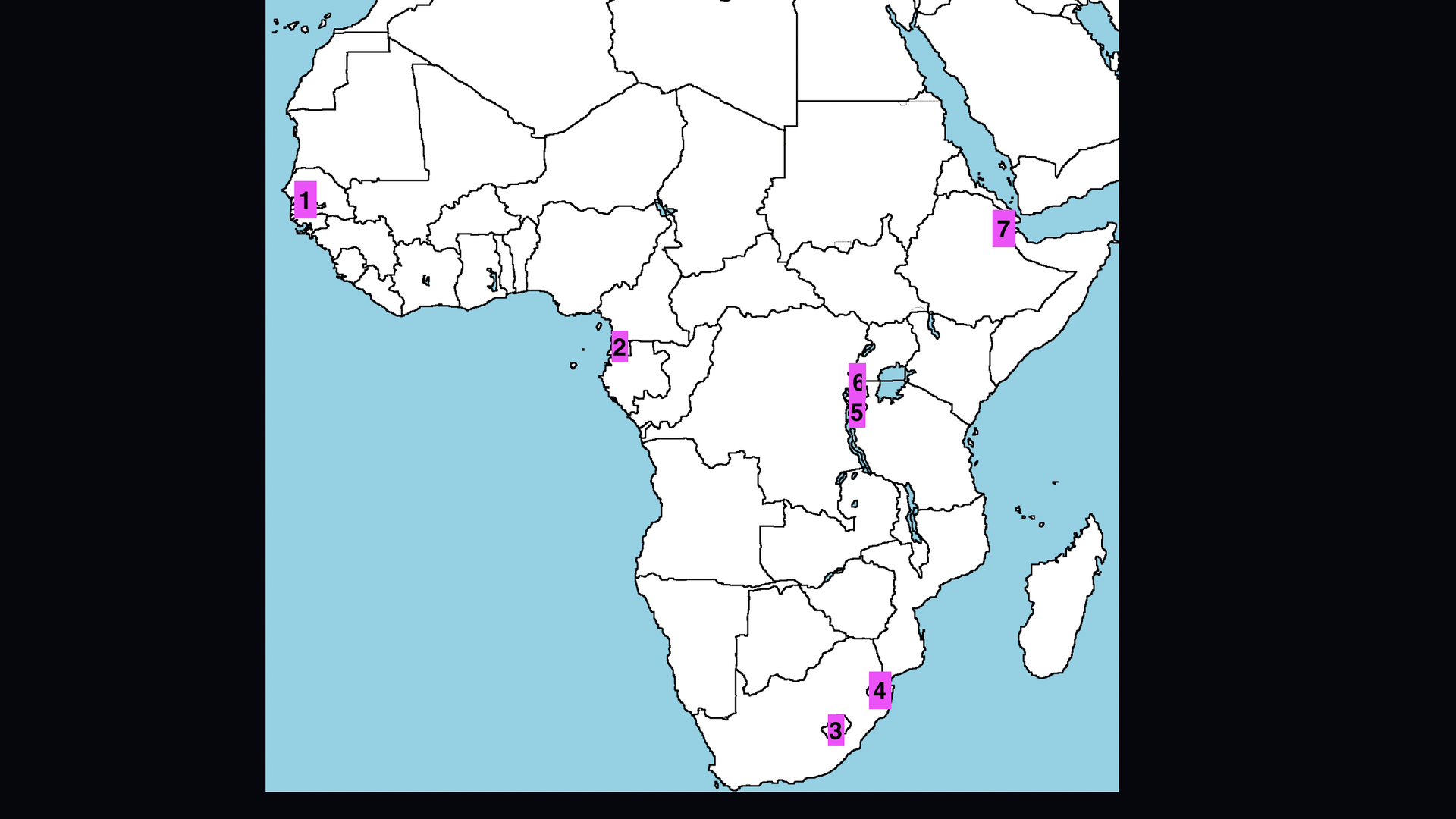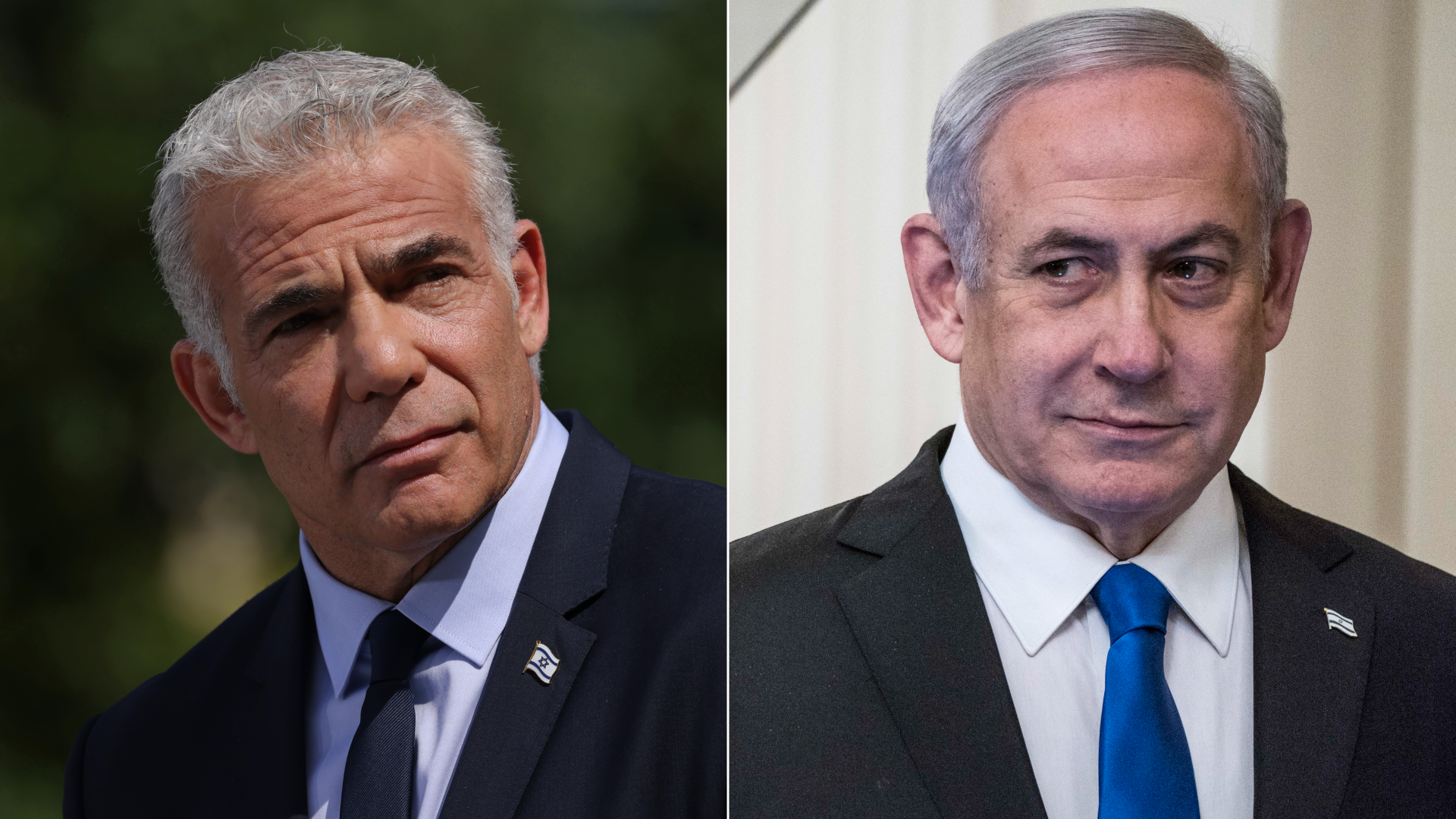| | | | | | | Presented By Babbel | | | | Axios World | | By Dave Lawler · Oct 20, 2022 | | Welcome back to Axios World. - Tonight's edition (1,922 words, 7 minutes) starts with the big news from Westminster before looking at Iranian drones, Netanyahu's comeback bid and Berlusconi's gifts for Vladimir Putin.
- While Truss is out after 45 days, Axios World is still going strong after 4.5 years. Thanks for being a reader.
| | | | | | 1 big thing: Brexit whirlwind carried Truss into power and out again |  Data: Axios research; Chart: Jared Whalen/Axios The U.K. will by next week have its fifth prime minister since the 2016 Brexit referendum — the same number as in the previous 37 years. Why it matters: The aftershocks of Brexit are still defining and dividing the Conservative Party, as Truss' swift ascent and swifter descent make clear. Flashback: David Cameron promised a referendum during his winning election campaign in 2015 to settle his party's long-standing internal squabble over EU membership. - Cameron and most senior Conservatives campaigned against Brexit. When they lost, Cameron resigned, Theresa May (a fellow "Remainer") came in, and the infighting only deepened.
- May's core challenge was to balance the promises of the Brexit campaign — "taking back control" on immigration and trade — with the need to preserve relations with a bloc that accounted for half of trade and shared a land border with the U.K. in Northern Ireland.
- Most voters, and indeed most politicians, didn't initially seem to grasp the bedeviling tradeoffs required. May was unable to navigate a path between Brexit purists and pragmatists and stepped down after three difficult years.
Then came Boris Johnson, who called and won an early election promising to "get Brexit done." - That 2019 election, and Johnson's tenure more generally, saw the party's MPs and its electorate shift from Cameron-esque centrism to a more hard-line vision on Brexit, immigration and trade.
- For a large swath of the Conservative Party, faith in Brexit has been packaged together with a general suspicion of expertise and institutions, and a belief that an unshackled U.K. can stand tall as a global power.
Truss, a Remainer-turned-Brexit hard-liner, was the purest possible manifestation of that shift. - When Johnson fell due to a string of scandals, with key Brexit questions still unresolved, the right flank in Parliament and in the broader party membership coalesced around Truss.
- When rivals and critics warned that slashing taxes while spending big on energy subsidies would supercharge inflation and interest rates, she called it "project fear" — an echo of the pro-Brexit campaign.
- Then, after economic turmoil did indeed come to pass and Truss was forced to ditch most of her platform, her right-wing former allies joined the centrist skeptics in demanding her resignation.
What's next: With the party's approval ratings at an all-time low, and an election looming in two years (or much sooner), the downtrodden Tory MPs must now decide to whom to turn. Many are emphasizing party unity while disagreeing about which contender can deliver it. - Fans of former chancellor Rishi Sunak, whose warnings about Truss' tax plans now look prescient, think he could begin to restore the party's tattered reputation for economic prudence.
- Supporters of House of Commons leader Penny Mordaunt contend that, as a fairly moderate Brexiteer, she can bring together the opposing flanks.
- A similar case can be made for Defense Secretary Ben Wallace, who declined to run over the summer but has been widely praised for his handling of Ukraine.
- Hard-liners like Suella Braverman and Kemi Badenoch — two former leadership candidates who later joined Truss' Cabinet (Braverman resigned yesterday) — could credibly claim today's Tory party has moved toward them and away from the squishy center.
- Then there's the man who led the Brexit campaign, won the Conservatives their current majority, and is reportedly inclined to throw his hat in the ring: Boris Johnson.
The bottom line: The post-Brexit identity crisis has played out with the Conservatives in power. A true reset might not be possible until they lose it. |     | | | | | | 2. How it happened: Quickest resignation ever |  Data: Axios research; Chart: Erin Davis/Axios Visuals Truss emerged from 10 Downing Street earlier today to concede that she could not "deliver the mandate on which I was elected by the Conservative Party." She'll be the shortest-tenured PM in U.K. history. Driving the news: The announcement followed a tumultuous day in which Home Secretary Braverman resigned and several senior Conservatives called on Truss to do the same. - "This whole affair is inexcusable. It is a pitiful reflection on the Conservative parliamentary party on every level, and it reflects very badly obviously on the government of the day," senior Conservative MP Charles Walker fumed to the BBC.
- Walker was speaking in the wake of a chaotic vote on Wednesday evening over fracking, which Truss supports but many Conservative MPs oppose.
- With Truss' lieutenants desperately pressuring MPs to vote with the government, a chaotic scene played out in which the chief whip reportedly announced she was resigning and Truss left the chamber to chase after her — causing both to miss the vote. That episode seemed to sum up Truss' short tenure.
What's next: Leadership contenders will need to secure the support of at least 100 MPs by Monday to reach the first ballot, meaning a maximum of three will qualify. - If only one reaches 100 backers, that person will be the next prime minister.
- If three candidates qualify, there will be a single round of voting among MPs, with the runner-up likely facing pressure to concede to avoid another messy contest.
- But if two candidates remain after the MPs have their say, an "expedited, binding online vote" will be held among party members, with results to be announced by next Friday.
|     | | | | | | 3. Most Americans back Ukraine aid; GOP leaders waver |  Data: Chicago Council Surveys; Chart: Jacque Schrag/Axios Most Americans from both parties continue to support arms shipments to Ukraine, according to polling out today from the Chicago Council on Global Affairs. Why it matters: House Minority Leader Kevin McCarthy (R-Calif.) publicly confirmed Tuesday what many in Washington and Europe privately fear: a Republican-controlled House could shut off the spigot funding Ukraine's efforts to defend itself against Russia's invasion, Axios' Andrew Solender and Zach Basu report. - "I think people are gonna be sitting in a recession and they're not going to write a blank check to Ukraine," McCarthy told Punchbowl News.
- In May, 57 House Republicans voted "no" on a $40 billion aid package to Ukraine. That number is poised to rise considerably.
- "After the $40 billion, there were a lot of Republicans saying, 'This is the last time I'm going to support Ukraine funding,'" one senior House Republican told Axios.
Some Republicans are calling on European allies to step up, particularly since the roughly $53 billion in total aid the U.S. has committed to Ukraine is about double the contributions of all EU countries combined. - House Armed Services Chairman Adam Smith (D-Wash.) told me in a recent interview that the U.S. should keep the pressure on countries like Germany without slowing its own contributions.
- Yes, but: Two diplomats from different European powers told me in recent weeks that there's simply no way they'd be able to fill the gap if U.S. arms shipments stopped.
|     | | | | | | A message from Babbel | | Say "ja" to learning a new language | | |  | | | | Babbel has what you need to learn how to hold real-world conversations in Dutch, Spanish and more. Learn through: - Expert-curated lessons.
- Speech technology that improves your accent.
- Context and cultural tips.
- Live online classes or videos.
Speak a new language in as little as three weeks. | | | | | | Bonus: Where in the world? |  | | | | Can you identify the seven countries in continental Africa that are smaller than the U.S. state of Maryland? Some hints to help you out: - No. 1 is surrounded by Senegal and starts with "The."
- No. 2 is on the equator. The U.S. fears China wants to establish a military base there, as it has in No. 7.
- Prior to independence, No. 3 was called Basutoland. No. 4 was called Swaziland until 2018.
- The U.K. wants to send asylum seekers to No. 6, which was once part of the same Belgian colonial territory as No. 5.
Scroll to the bottom for answers. |     | | | | | | 4. U.S. says Iran has forces in Ukraine |  | | | Russian President Vladimir Putin meets Iranian President Ebrahim Raisi in Tehran last July. Photo: Sergei Savostyanov/Sputnik via Getty Images | | | | The Pentagon said today that Iranian forces "have been on the ground in Ukraine to assist Russia with drone operations." State of play: Russia has been attacking Ukrainian cities and infrastructure with Iranian-made kamikaze drones. Iran has also agreed to supply ballistic missiles, according to Reuters. Tehran denied that. - Secretary of State Tony Blinken says the fact that Russia has to import military technology is a sign that U.S. sanctions are working, though clearly the convergence of two top adversaries is cause for concern.
- Ukraine has formally requested air defense systems from Israel in light of Iran's intervention, Axios' Barak Ravid reports. Thus far, Israel has been reluctant to take steps that might antagonize Moscow.
- The EU announced sanctions Thursday against three Iranian officials, and the U.S., U.K. and France raised the issue at the UN Security Council.
What to watch: Iran nuclear talks were already frozen, but they're entering a deep freeze as a result of the latest twist. - One key question is what, beyond money and a chance to indirectly confront the U.S., Iran might stand to gain from intervening on Russia's side in Ukraine.
More Ukraine headlines: |     | | | | | | 5. "Narrow window to prevent genocide in Tigray" |  | | | Tigrayan protesters demonstrate against the war in Tigray on Oct. 2 in Birmingham, U.K. Photo: Mike Kemp/In Pictures via Getty Images | | | | "There is a very narrow window now to prevent genocide in Tigray," World Health Organization chief Tedros Adhanom Ghebreyesus warned yesterday of his home region of Ethiopia, Axios' Laurin-Whitney Gottbrath writes. The big picture: Nearly two years of fighting between government and rebel forces in Tigray have created one of the world's worst humanitarian crises. What he's saying: "There is no other situation globally in which 6 million people have been kept under siege for almost two years," Tedros added. "Banking, fuel, food, electricity and health care are being used as weapons of war. Media is also not allowed and destruction of civilians is done in darkness." - UN Secretary-General António Guterres warned this week that the "situation in Ethiopia is spiraling out of control."
Driving the news: The warnings come as fighting intensifies between the Tigray People's Liberation Front and Ethiopian forces along with their Eritrean allies. - Government forces captured three key cities in Tigray earlier this week.
- The UN has accused Ethiopian forces of imposing a de facto blockade on Tigray, though some aid did reach the region earlier this year during a temporary ceasefire. That cease-fire broke down in August, and as the fighting escalates again, the humanitarian situation grows more dire.
What's next: Ethiopian national security adviser Redwan Hussein tweeted today that Ethiopia is committed to taking part in peace talks the African Union has scheduled for Oct. 24 in South Africa. - "However, [we] are dismayed that some are bent on preempting the peace talks & spreading false allegations against the defensive measures," he added without elaborating.
|     | | | | | | 6. One to watch: Netanyahu's comeback attempt |  | | | Prime Minister Yair Lapid and Benjamin Netanyahu. Photos: Sean Gallup/Sarah Silbiger/Getty Images | | | | With 11 days to go until Israel's fifth election in four years, the polls show former Prime Minister Benjamin Netanyahu just shy of a majority — meaning his hopes of returning to power hinge on the final push to rally his base, Axios' Barak Ravid reports. - Why it matters: As opposition leader, Netanyahu is campaigning while on trial for bribery, fraud and breach of trust. If his right-wing bloc gets 61 seats in the Knesset, he may proceed with legislative efforts to suspend his trial.
|     | | | | | | 7. Stories we're watching |  | | | Protests against the ruling junta in Conakry, Guinea. Photo: Cellou Binani/AFP via Getty Images | | | - China latest: Xi's push for scientific "self-reliance"; U.K. summons diplomat over attack on protester; Blinken warns of faster Taiwan timeline
- WHO shifts cholera vaccine strategy as outbreaks spread
- Hamas official visits Syria for first time since 2012
- Drones vs. deforesters in the Amazon
- French cement company to pay $780 million for helping ISIS
- Saudis imprisoned American over tweets, State Department confirms
- Saudis pressed Arab nations to publicly support OPEC+ cut
Quoted: "I reconnected a little bit with President Putin. Putin sent me 20 bottles of vodka and a very sweet letter for my birthday. I replied with 20 bottles of Lambrusco and an equally sweet letter. He declared me the first of his five true friends." — That's former Italian Prime Minister Silvio Berlusconi, for the second edition in a row. In leaked audio, Berlusconi also defended Putin's invasion of Ukraine. He's currently taking part in negotiations to form Italy's next government. |     | | | | | | A message from Babbel | | Language lessons you can use in the real world | | |  | | | | Language learning platform Babbel offers 10-minute lessons that are proven to help users learn a new language in just three weeks. How it's done: Instead of random phrases, you'll learn to hold real-world conversations with expert-curated lessons and more. Get up to 55% off your subscription | | | | Answers: 1. The Gambia; 2. Equatorial Guinea; 3. Lesotho; 4. Eswatini; 5. Burundi; 6. Rwanda; 7. Djibouti. |  | | Are you a fan of this email format? It's called Smart Brevity®. Over 300 orgs use it — in a tool called Axios HQ — to drive productivity with clearer workplace communications. | | | | | | Axios thanks our partners for supporting our newsletters. If you're interested in advertising, learn more here.
Sponsorship has no influence on editorial content. Axios, 3100 Clarendon Blvd, Arlington VA 22201 | | | You received this email because you signed up for newsletters from Axios.
Change your preferences or unsubscribe here. | | | Was this email forwarded to you?
Sign up now to get Axios in your inbox. | | | | Follow Axios on social media:    | | | | | |













No comments:
Post a Comment